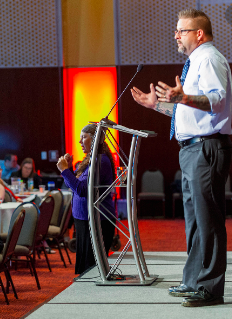Radical Hope:
A Conversation with Kevin Gannon
Act 1: Hope in Pandemic Times
Tina and Lucia talk to Kevin Gannon in June 2020, on the heels of a spring term in which we saw a mass pandemic-fueled shift to online teaching. Kevin describes the experiences and histories that led him to the field of critical pedagogy and introduces his hot-off-the-press book Radical Hope: A Teaching Manifesto. He talks us off the edge of online-teaching-despair, posing the jarring question: what would it look like if Paulo Freire built a MOOC?
Act 2: Telling Stories for a Better Future
We delve deeper into the status of critical pedagogy in hybrid and online teaching. The transition to remote modalities raises many issues: surveillance of students and teachers, the reproduction of capital for private tech corporations, issues of course adaptation, and the accessibility of online formats. What does a concept like “radical hope” actually mean in the context in which we find ourselves?
**Outro music is by Paul Myhre, “Embrace Life,” available on bandcamp.com.
about our guest/s

^Photo: https://www.thetattooedprof.com/about/
In our June 2020 podcast we spoke with Kevin Gannon, known as the Tattooed Professor on his blog and on Twitter (@TheTattooedProf). An author of the recently-published book Radical Hope: A Teaching Manifesto, Kevin is based at Grand View State University. He serves as the Director of the Center for Excellence in Teaching and Learning and Professor of History. Kevin teaches U.S., Latin American, and capitalist histories and is working on a forthcoming book, A Continental History of the Civil War and Reconstruction (Routledge, 2021). His scholarship on the history of reconstruction led to his appearance on Ava DuVernay’s Oscar-nominated documentary 13TH (see also this interview with Kevin and Malkia Cyril on Democracy Now in 2016). Kevin also writes about pedagogy for the Teaching United States History (TUSH) Collective and for the Chronicle for Higher Education. We were excited to speak to him about his new book and about the challenges of remote and digital teaching.